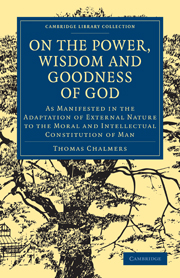 On the Power, Wisdom and Goodness of God
On the Power, Wisdom and Goodness of God Published online by Cambridge University Press: 29 August 2010
1. We have hitherto confined our attention to certain great and simple phenomena of our moral nature, which, though affording a different sort of evidence for the being of God from the organic and complicated structures of the material world—yet, on the hypothesis of an existent Deity, are abundantly decisive of His preference for virtue over vice, and so of the righteousness of His own character. That he should have inserted a great master faculty in every human bosom, all whose decisions are on the side of justice, benevolence, and truth, and condemnatory of their opposites; that He should have invested this conscience with such powers of instant retribution, in the triumphs of that complacency wherewith He so promptly rewards the good, and the horrors of that remorse wherewith He as promptly chastises the evil; that beside these, He should have so distinguished between virtue and vice, as that the emotions and exercises of the former should all be pleasurable, and of the latter painful to the taste of the inner man; that He should have so ordained the human constitution, as that by the law of habit, virtuous and vicious lives, or series of acts having these respective moral qualities, should issue in the fixed and permanent results of virtuous and vicious characters—these form the important generalities of our moral nature: And while they obviously and immediately announce to us a present demonstration in favour of virtue; they seem to indicate a preparation and progress towards a state of things; when, after that the moral education of the present life has been consummated, the great Ruler of men will manifest the eternal distinction which he puts between the good and the evil.
To save this book to your Kindle, first ensure [email protected] is added to your Approved Personal Document E-mail List under your Personal Document Settings on the Manage Your Content and Devices page of your Amazon account. Then enter the ‘name’ part of your Kindle email address below. Find out more about saving to your Kindle.
Note you can select to save to either the @free.kindle.com or @kindle.com variations. ‘@free.kindle.com’ emails are free but can only be saved to your device when it is connected to wi-fi. ‘@kindle.com’ emails can be delivered even when you are not connected to wi-fi, but note that service fees apply.
Find out more about the Kindle Personal Document Service.
To save content items to your account, please confirm that you agree to abide by our usage policies. If this is the first time you use this feature, you will be asked to authorise Cambridge Core to connect with your account. Find out more about saving content to Dropbox.
To save content items to your account, please confirm that you agree to abide by our usage policies. If this is the first time you use this feature, you will be asked to authorise Cambridge Core to connect with your account. Find out more about saving content to Google Drive.